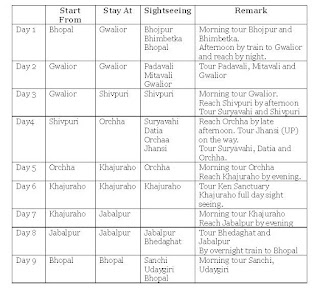 It has three UNESCO World Heritage Sites: the 9th - 10th century temples at Khajuraho, remains of the 3rd - 7th century BC Buddhist settlement at Sanchi; and cave paintings dating to 8000 BC at Bhimbetka. Apart from this There are plenty of rich cultural heritage sites. Gwalior is famous for the forts and palaces. Shivpuri is known for wild life and cenotaphs, Orchha and Datia is known for the palaces, Jabalpur well known for its natural water resource and marbles. The capital, Bhopal is a former princely state, a small city celebrated for its mosques and palaces, old-town ambiance. The hill-citadel of Mandu (near Indore) is renowned for its ruins set in greenery, especially after monsoons. Ujjain is a holy city for the Hindus. Other less known sites like Padavali, Mitavali, Suryavahi also have rich cultural heritage. The scenic sanctuaries of Kanha and Bandhavgarh National Parks are mostly savanna grassland terrains that have tigers and elephants as prime attractions.
It has three UNESCO World Heritage Sites: the 9th - 10th century temples at Khajuraho, remains of the 3rd - 7th century BC Buddhist settlement at Sanchi; and cave paintings dating to 8000 BC at Bhimbetka. Apart from this There are plenty of rich cultural heritage sites. Gwalior is famous for the forts and palaces. Shivpuri is known for wild life and cenotaphs, Orchha and Datia is known for the palaces, Jabalpur well known for its natural water resource and marbles. The capital, Bhopal is a former princely state, a small city celebrated for its mosques and palaces, old-town ambiance. The hill-citadel of Mandu (near Indore) is renowned for its ruins set in greenery, especially after monsoons. Ujjain is a holy city for the Hindus. Other less known sites like Padavali, Mitavali, Suryavahi also have rich cultural heritage. The scenic sanctuaries of Kanha and Bandhavgarh National Parks are mostly savanna grassland terrains that have tigers and elephants as prime attractions.The itinerary that we followed for my trip is as follows. We reached Bhopal overnight and started my trip next day early morning. During our journey we also covered Jhansi which falls in the different state and that is Utter Pradesh.
 My family comprising of 4 adults and 2 kids enjoyed our experience owing to the good road network in the state. The travel and sight seeing was done by train and SUV. We had booked the accommodation and vehicle at all the places before the start of journey.
My family comprising of 4 adults and 2 kids enjoyed our experience owing to the good road network in the state. The travel and sight seeing was done by train and SUV. We had booked the accommodation and vehicle at all the places before the start of journey.Friends, it was a pleasant experience and let me share the details with you in the subsequent posts.
From Bhopal, we traveled to Bhojpur.
Distance: Bhopal ---> Bhojpur 28 kms
To see the World visit other participants at: That's My World Tuesday.


